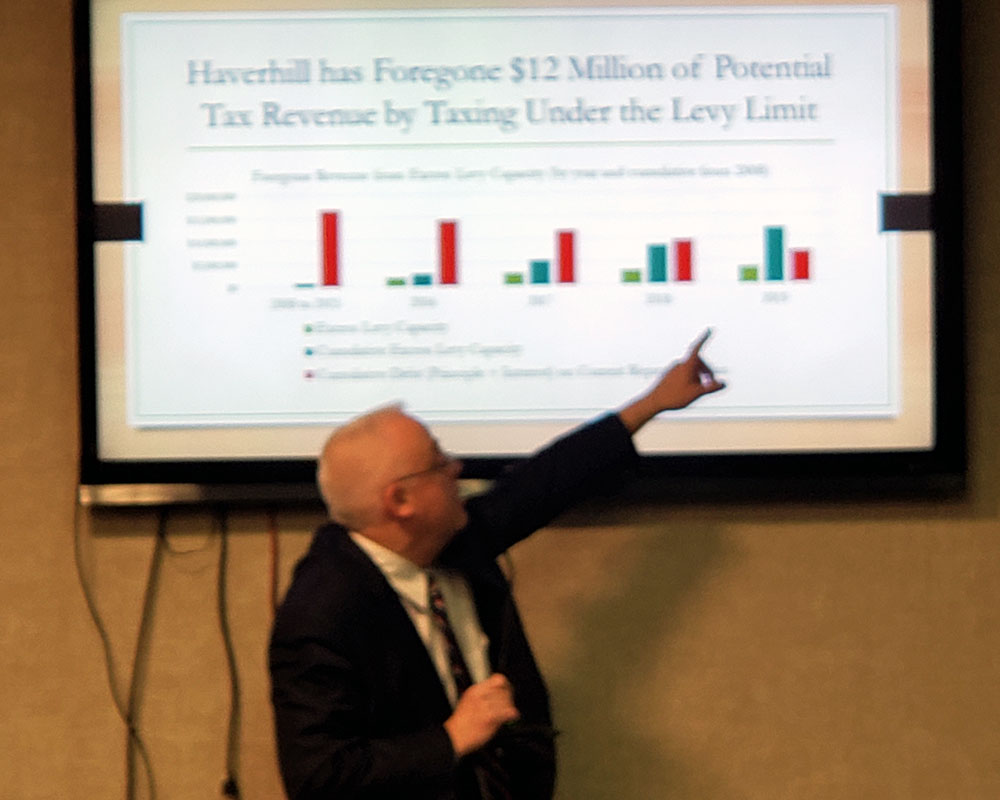A request of the state to help Haverhill pay its debt deteriorated Tuesday night into a debate over local property taxes.
Mayor James J. Fiorentini walked away with unanimous approval of his petition to request the state continue paying a portion of the former Hale Hospital losses. Council President John A. Michitson used the opportunity to emotionally argue that had the city taxed a bit more the last three years, debts related to the city-owned hospital would have been paid off.
“This is why there is another opinion in the city. This is exactly the reason why, and so the gig is up,” Michitson said.
Michitson explained the city gave property owners relief to the tune of $12.2 million—about as much money needed to pay off the remaining cost of construction the new building in 1984 and what’s left of borrowing to cover operating losses. When the hospital closed in 2001, it still faced costs of $26 million on the building and $37 million in operating losses.
Councilor Colin F. LePage said the city should have predicted the hospital’s fate sooner with losses year after year. “From 1980 to 2002, the streak was 14-1. They lost 14 years,” he said.
Fiorentini argued the hospital really lost money every year because, he charged, the outside management company, Quorum, kept two sets of books. He agreed the city should have sold the hospital sooner, but said the decision to enter healthcare was the right one in 1931.
“Why did we ever go into the hospital business? It wasn’t a business. It never was. The only hospital in the City of Haverhill went bankrupt during the great depression. Hundreds of people would have died,” the mayor answered councilors.
Councilor Timothy J. Jordan questioned why the state would give the city more money when the city hasn’t accepted its share of responsibility. “We’re basically using some of the state money to give our residents a tax break.”
He and Michitson explained most of the about $20 million former Rep. Brian S. Dempsey delivered to the city in special aid wasn’t used to pay off the hospital, but rather avoid taxing to the limit allowed by Proposition 2 ½. Fiorentini quipped, “You mean tax to the max.”
The mayor countered the City Council hasn’t done its part to bring in more money, noting the defeat of an over-55 housing development off East Broadway. He said that project would have generated $450,000 annually in extra money for schools and police.
Because Haverhill has always been the hub for area towns, Councilor Joseph J. Bevilacqua said there are many reasons for the state to help pay.
“Whittier Regional High School, the regional trash facility, Northern Essex Community College, the court house, more affordable housing than most other communities in our region, the regional bus system and the Registry are just some examples of how Haverhill serves the region,” Bevilacqua said.
Bevilacqua and Fiorentini said the Council’s discussion could very well discourage the governor and the legislature from helping Haverhill.
Councilors also voted 6-3 to ask for more information about the actual cost of health insurance and pension costs related to the hospital—now estimated at more than $5 million each year. Fiorentini said it would cost between $7 and 10,000 to hire an actuary to break out the number, but that he agreed.
A related discussion on the city’s pension costs was postponed.

